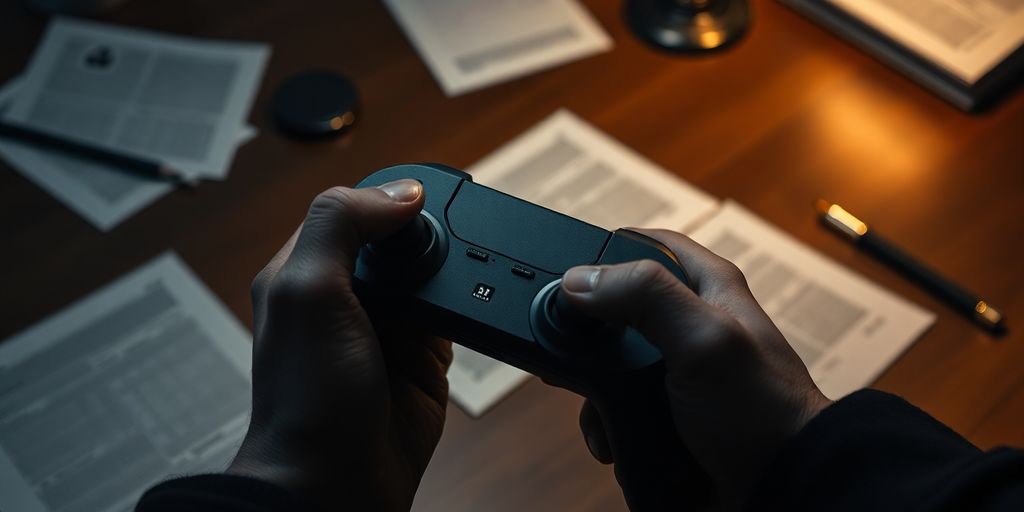
Video games are a big part of life for many people, but sometimes, what starts as fun can become a real problem. When gaming takes over, it can mess with school, work, and even health. If you or someone you know has been seriously impacted by too much gaming, you might be wondering what to do. There’s a legal path called a video game addiction lawsuit that some people are looking into. This kind of lawsuit tries to hold game companies responsible when their products might lead to addiction. It’s a complex area, but understanding the basics can help you see if this is something for you.
Key Takeaways
- Video game addiction lawsuits are a way to seek money for harm caused by excessive gaming.
- Proving a direct link between a game and addiction can be hard, often needing expert opinions.
- Lawsuits might cover things like medical bills, lost income, and emotional distress from addiction.
- A lawyer can help you build your case and deal with the legal process.
- If you think you have a claim, start by documenting everything and talking to an attorney.
Understanding Video Game Addiction Lawsuits
The Rise of Video Game Addiction
Video games have changed a lot. They’re not just simple games anymore; they’re super immersive with detailed stories, ways to play with others, and reward systems that keep you hooked. While these things make gaming fun, they can also lead to addictive behaviors. For some people, it gets out of control, messing up their daily lives, school, work, and relationships.
Determining If You Have a Case
Figuring out if you have grounds for a lawsuit against a gaming company involves something called “product liability.” Basically, companies need to make sure their products are safe to use. If a product, like an addictive game, has the potential to cause harm, the company might have to warn people about the risk. A video game addiction lawsuit is based on this concept.
How to File a Video Game Addiction Lawsuit
Filing a lawsuit isn’t something you should do without help. Here’s a simplified view of the process:
- Find a lawyer: Look for someone who knows about product liability and addiction cases.
- Gather evidence: Collect anything that shows how the game affected you, like medical records or gaming logs.
- File the complaint: Your lawyer will file a formal complaint with the court, explaining your case.
- Negotiate or go to trial: The company might offer a settlement, or you might have to go to court. This can be a long process.
It’s important to remember that every case is different, and there’s no guarantee of winning. However, taking action can be a step toward getting compensation and holding companies accountable.
Common Challenges in Video Game Addiction Lawsuits
While pursuing a video game addiction lawsuit might seem like a straightforward path, there are definitely some hurdles you’ll need to clear. It’s not always easy, and here’s why:
Establishing Causation
One of the biggest problems is showing that the video game directly caused the addiction and the resulting harm. You have to prove that the game, and not something else, is the reason for the issues. This often requires expert testimony from psychologists or addiction specialists who can explain the link between the game’s design and the addictive behavior. It’s not enough to say, “I played this game a lot and now I’m messed up.” You need solid evidence.
Countering Defense Arguments
Game companies aren’t just going to roll over. They’ll likely argue that they provide tools to help people manage their gameplay, like parental controls or time limits. They might also say it’s up to the user to keep track of their own habits. It’s a bit like a fast food company saying, “We sell burgers, but it’s your fault if you eat too many.” Expect these kinds of arguments and be ready to counter them.
Securing Evidence of Addiction
Getting solid proof of the addiction is super important. This means more than just saying you played a lot. You need things like:
- Gaming logs showing how much time was spent playing.
- Reports from therapists or doctors diagnosing the addiction.
- Statements from family or friends about how the gaming affected your behavior.
- School or work records showing a decline in performance.
Basically, the more evidence you have, the stronger your case will be. It’s about building a clear picture of the addiction and its impact on your life. Without this, it’s just your word against a big company’s lawyers.
Damages Sought in Video Game Addiction Lawsuits

Medical Treatment Costs
Video game addiction, like any addiction, can lead to significant health problems. Therapy is often required to address the psychological aspects of the addiction, and sometimes, medical intervention is needed to deal with related physical issues like sleep deprivation or carpal tunnel syndrome. These costs can really add up. It’s not just the initial treatment either; ongoing care and support might be necessary to prevent relapse. Documenting these expenses is key to including them in a lawsuit.
Lost Wages and Productivity
One of the most direct financial impacts of video game addiction is the loss of income. People struggling with addiction may find it hard to keep a job or perform well at school. They might call in sick often, show up late, or just not be able to focus on their work. This can lead to job loss, missed promotions, and a general decline in career prospects. For students, it could mean failing grades, dropping out of school, and reduced future earning potential. Quantifying these losses can be tricky, but it’s a crucial part of seeking damages.
Pain and Suffering
Video game addiction isn’t just about money; it also takes a toll on a person’s emotional and mental well-being. The constant craving to play, the guilt and shame associated with the addiction, and the impact on relationships can cause significant pain and suffering. This can manifest as anxiety, depression, social isolation, and a general decrease in quality of life. While it’s hard to put a number on these things, they are very real and can be considered when seeking damages.
It’s important to remember that every case is different, and the amount of damages awarded will depend on the specific circumstances. Factors like the severity of the addiction, the impact on the person’s life, and the available evidence will all play a role in determining the outcome.
How a Lawyer Can Support Your Video Game Addiction Lawsuit Case
Navigating the legal system can be tough, especially when you’re up against big gaming companies. A lawyer who knows the ins and outs of video game addiction lawsuits can really make a difference. They’re not just there to fill out paperwork; they’re there to fight for your rights and get you the compensation you deserve.
Building a Strong Case
An experienced attorney will dig deep to gather all the evidence needed to support your claim. This includes things like your gaming activity records, mental health evaluations, and expert testimony that shows how certain game designs can be addictive. They’ll work to connect your addiction directly to the games you were playing.
Negotiating a Fair Settlement
Most companies would rather settle out of court than deal with a long, drawn-out legal battle. A lawyer can negotiate with the gaming company to reach a fair settlement. They know what your case is worth and will fight to get you the compensation you deserve. This can save you time and stress, and potentially get you compensation faster than going to trial.
Representing You in Court
If a settlement can’t be reached, your lawyer will be ready to take your case to court. They’ll prepare everything, from presenting evidence to questioning witnesses. With their knowledge of product liability law and courtroom experience, they can effectively argue your case and counter the defense’s strategies. If you’re wondering about eligibility criteria, a lawyer can help you understand if you meet the requirements to file a lawsuit.
Having a lawyer on your side means you don’t have to face the gaming companies alone. They’ll handle the legal complexities, so you can focus on your recovery and well-being.
Steps to Take If You Believe You Have a Claim
If you think video game addiction is negatively affecting your life, or someone you care about, there are some important steps to consider. These steps can help you understand the situation better and potentially build a stronger case if you decide to pursue legal action.
Document Damages and Symptoms
Keeping detailed records is super important. Write down everything. This includes sleep problems, any mental health issues like anxiety or depression, and how gaming has messed up your daily life. The more you document, the clearer the picture will be. Think of it like this, you are creating a timeline of how the addiction has impacted your life. This can be really helpful later on.
Seek Professional Help
Talking to a professional is a big step. A therapist or addiction specialist can give you a real diagnosis and help you figure out a treatment plan. This isn’t just about getting better; it’s also about having documented proof of the addiction. They can assess the severity and provide expert opinions that could be useful in a video game addiction lawsuit.
Consult with an Attorney
It’s a good idea to talk to a lawyer who knows about product liability and addiction cases. They can explain your rights and help you figure out if you have a case.
A lawyer can assess the specifics of your situation, explain the legal options available, and guide you through the process. They can also help you understand the potential challenges and benefits of pursuing a lawsuit.
Here’s a quick checklist to get you started:
- Gather all relevant documents (gaming logs, receipts, medical records).
- Write down a detailed account of how the addiction has affected your life.
- Prepare a list of questions for the attorney.
Qualifying for a Video Game Addiction Lawsuit

Identifying Addiction Symptoms
Figuring out if you or someone you know has a real video game addiction can be tricky. It’s not just about how many hours are spent playing. It’s more about how gaming affects other parts of life. Here are some things to watch out for:
- Neglecting responsibilities: Schoolwork, chores, or even personal hygiene start to slide.
- Withdrawal symptoms: Feeling irritable, anxious, or sad when not playing.
- Tolerance: Needing to play more and more to get the same level of enjoyment.
- Lying about gaming habits: Hiding how much time is really spent playing.
How to Determine if Your Case Meets the Requirements
Not every case of excessive gaming qualifies for a lawsuit. Legal teams will look at a few key things to see if you have a case. First, they’ll want to see proof of excessive gaming. This could be from game console logs (if available), or even just detailed notes about gaming habits. They’ll also look for a medical or psychological diagnosis related to the addiction, like depression or anxiety linked to gaming. The age of the person affected is also important; many firms focus on cases involving younger individuals.
What Compensation Can Plaintiffs Receive
If a video game addiction lawsuit is successful, what kind of compensation can you expect? It really depends on the specifics of the case, but here are some common types of damages that might be awarded:
- Medical expenses: Covering the costs of therapy, counseling, or medication related to the addiction.
- Lost income: If the addiction led to job loss or reduced productivity, you might be able to recover lost wages.
- Pain and suffering: This covers the emotional distress and mental anguish caused by the addiction.
- Punitive damages: In some cases, if the gaming company’s actions were particularly reckless or negligent, punitive damages might be awarded to punish them and deter similar behavior in the future.
It’s important to remember that every case is different, and there’s no guarantee of a specific outcome. Talking to a lawyer is the best way to understand your options and what kind of compensation you might be able to pursue.
Court Responses to Video Game Addiction Lawsuits
Multidistrict Litigation Considerations
There was a push last year to consolidate video game addiction lawsuits into multidistrict litigation (MDL). The idea behind an MDL is to handle similar lawsuits together, which should make the legal process smoother and more efficient. However, the U.S. Judicial Panel on Multidistrict Litigation (JPML) decided against it. It’s worth keeping an eye on this, as future cases might change their minds. This could affect how video game addiction lawsuits are handled going forward.
Legal Precedents and Outcomes
It’s still early days for video game addiction lawsuits, so there aren’t a ton of legal precedents to point to. We’re seeing some interesting arguments being made, though. For example, game companies are claiming First Amendment protection, but plaintiffs are drawing parallels to cases against tobacco and opioid companies, where courts ruled against corporations when their products caused harm. The outcomes of these early cases will definitely shape how future lawsuits are approached and argued.
Future of Video Game Addiction Litigation
The future of video game addiction litigation is uncertain, but it’s definitely gaining momentum. We’re seeing more families come forward, especially concerning the impact on children. These lawsuits often accuse gaming companies of using psychological tactics to make games more addictive, particularly targeting young players. It’s likely we’ll see more litigation scrutinizing the gaming industry’s impact on vulnerable populations, especially if the industry doesn’t self-regulate more effectively.
It’s important to remember that this area of law is constantly evolving. What seems like a long shot today could become a viable legal strategy tomorrow. Keep informed, and if you think you have a case, talk to a lawyer.
Moving Forward with Confidence
Video game addiction is a growing problem that can really mess things up, both with money and feelings. If gaming addiction has hit you hard, and you think a company messed up, going to court can help you get some money back and make the company take responsibility. With a good lawyer on your side, you can build a case that not only tries to get you paid for what you lost but also shines a light on this whole issue.
Frequently Asked Questions
What is the basis of the video game addiction lawsuits?
These lawsuits are not just about kids playing too many video games. That is what the defendants desperately want you to believe. But you must do what a jury will do: listen to the evidence with an open mind. This is about deliberate, calculated decisions made by the biggest names in the gaming industry—Epic Games, Activision Blizzard, and others—to create games that are as addictive as possible.
How Long Does a Video Game Addiction Lawsuit Take to Resolve?
If you or a loved one has suffered from gaming addiction, you may want help navigating the complex legal landscape and fighting for your rights. Don’t face this challenge alone – contact a video game addiction lawyer who can protect your right to compensation to cover your damages.
Do I Need to Go to Court for a Video Game Addiction Case?
Not necessarily. You can file a gaming addiction lawsuit and still keep the process out of court. You can negotiate a settlement, which would keep you from going to trial. Your video game addiction lawsuit lawyer can help you determine the best option for your situation.
How Do I Know If I Qualify for a Video Game Addiction Lawsuit?
You may qualify for a video game addiction lawsuit if your child plays or played video games (e.g., Roblox, Call of Duty, Fortnite, Minecraft, or Grand Theft Auto (GTA)) for several hours a day each day for several weeks or months.
How to File a Video Game Addiction Lawsuit?
An experienced lawyer can help you file a video game addiction lawsuit if you qualify. You can sign up for a free case review through Consumer Notice to be contacted by a legal expert who can help determine whether you can file a case. If you are considering filing a lawsuit, gather records to help your case. This includes information on how often you or your child plays video games, financial records related to in-game purchases and any video game addiction diagnoses.
What Compensation Can Plaintiffs Receive?
Plaintiffs who have filed video game addiction lawsuits are seeking several different types of damages. Some lawsuits have pursued damages for loss of companionship and community because of the toll video game addiction can have on social well-being. Compensation for economic injuries is also sought in some litigation. Additionally, claims have cited emotional distress, mental anguish and pain as a result of using certain video games designed to addict their users.






